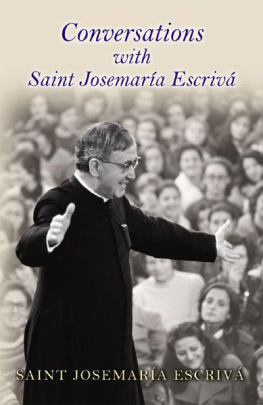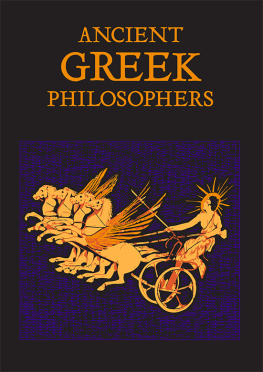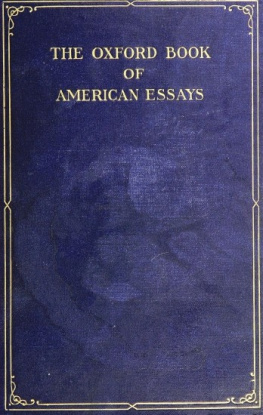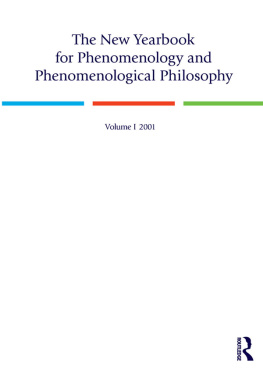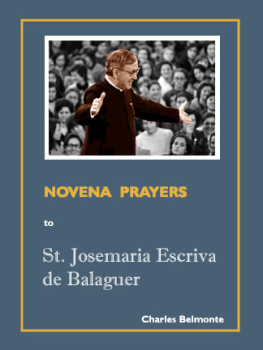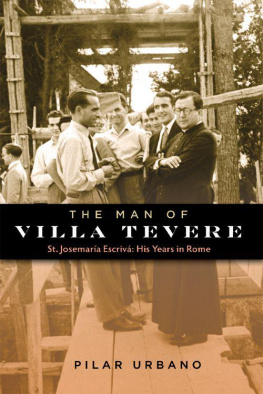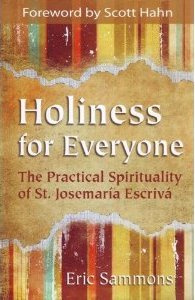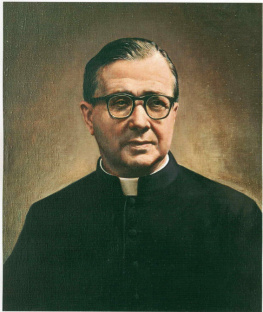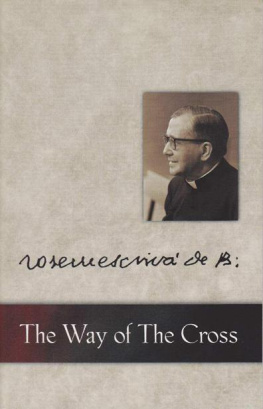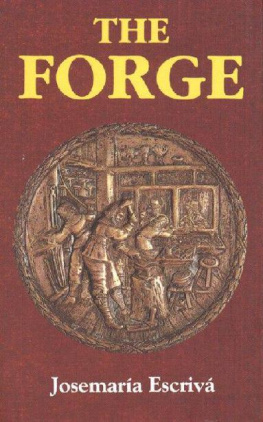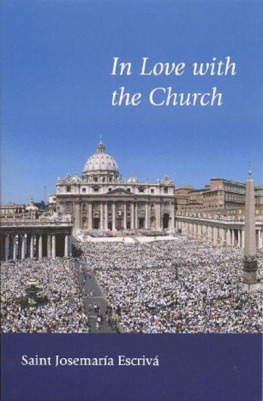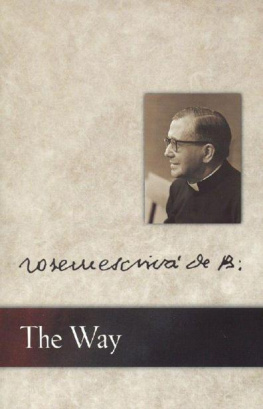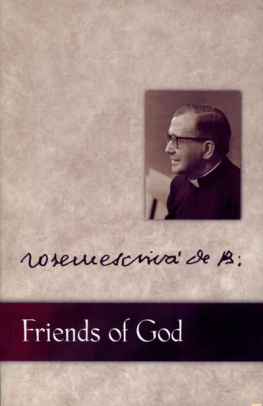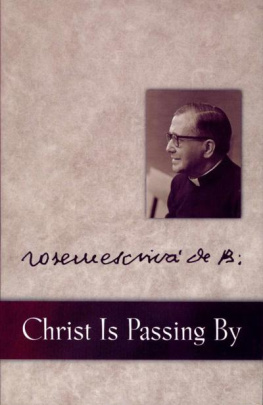misc. authors - Conversations with Saint Josemaría Escrivá
Here you can read online misc. authors - Conversations with Saint Josemaría Escrivá full text of the book (entire story) in english for free. Download pdf and epub, get meaning, cover and reviews about this ebook. year: 0, genre: Religion. Description of the work, (preface) as well as reviews are available. Best literature library LitArk.com created for fans of good reading and offers a wide selection of genres:
Romance novel
Science fiction
Adventure
Detective
Science
History
Home and family
Prose
Art
Politics
Computer
Non-fiction
Religion
Business
Children
Humor
Choose a favorite category and find really read worthwhile books. Enjoy immersion in the world of imagination, feel the emotions of the characters or learn something new for yourself, make an fascinating discovery.
- Book:Conversations with Saint Josemaría Escrivá
- Author:
- Genre:
- Year:0
- Rating:4 / 5
- Favourites:Add to favourites
- Your mark:
- 80
- 1
- 2
- 3
- 4
- 5
Conversations with Saint Josemaría Escrivá: summary, description and annotation
We offer to read an annotation, description, summary or preface (depends on what the author of the book "Conversations with Saint Josemaría Escrivá" wrote himself). If you haven't found the necessary information about the book — write in the comments, we will try to find it.
Conversations with Saint Josemaría Escrivá — read online for free the complete book (whole text) full work
Below is the text of the book, divided by pages. System saving the place of the last page read, allows you to conveniently read the book "Conversations with Saint Josemaría Escrivá" online for free, without having to search again every time where you left off. Put a bookmark, and you can go to the page where you finished reading at any time.
Font size:
Interval:
Bookmark:

Conversations
with Saint Josemara Escriv
SAINT JOSEMARA ESCRIV
Conversations
with
Saint Josemara
Escriv

CONVERSATIONS WITH JOSEMARA ESCRIV
Translated from Conversaciones con Mons. Escriv de Balaguer
Translation, Introduction, Footnotes, and Indices are copyright Fundacin Studium, Madrid, and are used with permission.
To learn more about St. Josemara Escriv and Opus Dei,go to www.josemariaescriva.info and www.escrivaworks.org .
First published November 1968
This edition copyright 2007
Scepter Publishers Inc., New York
www.scepterpublishers.org
All rights reserved
eBook ISBN 978-1-59417-102-4
Typeset in ITC Garamond fonts
Printed in the United States of America
Contents
This book gathers together the texts of interviews given by Monsignor Escriv de Balaguer to journalists from a number of countries. It also includes the text of a homily delivered by Monsignor Escriv at the University of Navarre (Spain) during an assembly of the Friends of the University attended by more than forty thousand people from Spain, Italy, Germany, France, Portugal, and other European countries. This homily gives a very clear and direct expression to some central aspects of the spirit which runs through all Monsignor Escrivs answers in the various interviews.
For many people, Josemara Escrivs name is linked with a book, The Way , which has been called the Kempis of modern times, a best-seller in the field of spiritual literature. First published in 1934 as Consideraciones espirituales, it has gone through 181 editions in 35 languages, with a total printing to date of more than three million copies. People of the most varied backgrounds have discovered in its counsels, full of supernatural spirit, a way to have a life of union with God in the middle of the world.
To anyone who follows the life of the Church, the name of Josemara Escriv immediately calls to mind that of Opus Dei, an institution which, from its foundation in 1928, came to remind Christians that sanctity is not something for the privileged few, because all the paths of the earth can be divine. A channel was thus opened for men and women living in the worldordinary peopleeffectively to seek sanctity and to carry out apostolate with a genuine and fully secular dedication and with a specifically lay spirituality.
The importance of Opus Dei as a pastoral phenomenon in the Church, as well as a sociological phenomenon, is easy to recognize today. When Monsignor Escriv died, on June 26, 1975, Opus Dei had already spread to five continents, with a membership of more than sixty thousand people of eighty nationalities. On September 15, 1975, Monsignor Alvaro del Portillo was elected as his successor, after having been his closest collaborator for forty years. While keeping the momentum of Opus Deis growth and holding on most faithfully to the founders spirit, Monsignor del Portillo went on with the workinitiated by Monsignor Escriv with the encouragement of Paul VIof finding for Opus Dei the permanent juridical framework adapted to its foundational charism and sociological reality, rather than the juridical clothing of a secular institute, which was worn at that time by Opus Dei.
This work came to an end on November 28, 1982, when His Holiness John Paul II erected Opus Dei as a personal Prelature, just as Monsignor Escriv had wished many years back. In short, the legal status of Opus Dei in the Church is that of a personal Prelature of worldwide scope, endowed with its own statutes and with its central seat at Rome.
The present volume gathers from the lips of its founder several explanations of what Opus Dei is, as well as a number of descriptions of the basic aspects of its juridical status and organization. These statements can be fully grasped only if one bears in mind what was mentioned above, namely, that Opus Dei at that time found itself in a temporary juridical situation, and so Monsignor Escriv could not useeven though at times he hinted at itthe terminology adapted to the definitive juridical framework, which he had foreseen but which had not yet been arrived at. Specifically, throughout this volume the reader will find terms such as Association referring to Opus Dei, and President General referring to the Prelate. For this reason it has been thought appropriate, besides the present explanations, to add some brief explanatory notes to the text.
It should be pointed out that the difficulty of having to use an inadequate juridical terminology is overcome by the gift of tongues of Monsignor Escriv. The reader can therefore draw from his answersaside from many clear criteria regarding current issues in the life of the Church and of societya broad and deep knowledge of the spiritual, pastoral, and juridical reality of Opus Dei. Nevertheless, the reading will be even more profitable if one has a previous knowledge of the present juridical status of this institution, to which there are implicit allusions in some of Monsignor Escrivs answers. This is the reason for the following paragraphs.
Since its erection as a personal Prelature, Opus Dei is composed of a Prelate, who is its own Ordinary; of the clergy or presbytery of the Prelature, who are the priests incardinated in Opus Dei; and of the lay people who have been freely incorporated or will be in the future.
The priests come exclusively from the ranks of the laymen of Opus Dei, and they receive Holy Orders after having completed the required ecclesiastical studies. No priests or candidates for the priesthood are therefore taken from any diocese. The lay people of the Prelature are men and women, single or married, of every race and sector of society, without any restriction for reasons of health, age, family situation, professional status, or any similar circumstance.
For all the faithful belonging to Opus Deiwhether they are clerics or lay peoplethe calling is one and the same, viz., a definite vocation whereby, in a manner suited to their various circumstances and personal situations, they take up the same ascetical and formative commitments, and all the members of the Prelature have a full share in the special apostolate carried out by Opus Dei.
The Opus Dei Prelaturewhich constitutes a pastoral unit both organic and indivisiblecarries out its apostolic action through both the Mens Section and the Womens Section under the government and direction of the Prelatewho provides and assures the fundamental unity of spirit and jurisdiction of both Sectionsand of his Vicars with the pastoral assistance of the Prelatures clergy.
The Prelate, who is the Ordinary of the Opus Dei Prelature, governs both Sections, helped by his councils, which are distinct for each Section. In each country there are similar councils to assist the Regional Vicar in his work of government.
The Prelate has an ordinary power of government or jurisdiction, limited to whatever refers to the specific aim of the Prelature. This area of his jurisdiction differs substantially, on account of its matter, from the jurisdiction of diocesan bishops for the ordinary pastoral care of the faithful. Aside from governing his own clergy, the Prelates jurisdiction includes the general direction of the training and specific spiritual and apostolic attention received by the lay people incorporated to Opus Dei with a view to a more intense dedication to the service of the Church.
The lay members are under the jurisdiction of the Prelate in whatever refers to the fulfillment of the special commitmentsascetical, formative, and apostolicwhich they freely make by means of the bond of dedication to the Prelatures specific aim.
Next pageFont size:
Interval:
Bookmark:
Similar books «Conversations with Saint Josemaría Escrivá»
Look at similar books to Conversations with Saint Josemaría Escrivá. We have selected literature similar in name and meaning in the hope of providing readers with more options to find new, interesting, not yet read works.
Discussion, reviews of the book Conversations with Saint Josemaría Escrivá and just readers' own opinions. Leave your comments, write what you think about the work, its meaning or the main characters. Specify what exactly you liked and what you didn't like, and why you think so.

